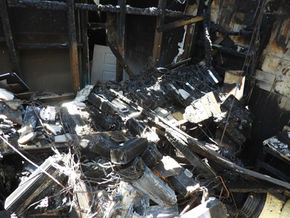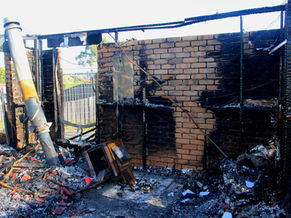top of page
Welcome to What The Fire
The social media arm of Forensic Origin & Cause Investigations.
Through What The Fire, we explore the world of fire science and fire investigations. Our mission is to provide expert insights into fire-related incidents, share cautionary case studies, and offer an inside look at the life of a fire investigator. With over 10 years of experience in fire investigation, we are committed to educating those who are interested in fire with bite-sized easily digestable information.
Follow us to stay in the loop.
Search


When the Music Stops: A Global History of Nightclub Fires and the Lessons We Still Refuse to Learn
In the early hours of New Year’s Day, a fire occurred within a basement nightclub in Switzerland, turning celebration into catastrophe. What reportedly began as a moment of spectacle, involving sparkler-style celebratory effects common in nightlife venues, rapidly escalated into a lethal fire environment. Within minutes, smoke, heat, and panic overwhelmed the space ending with lives lost.
Jan 55 min read


Australia’s 2025–26 Bushfire Season: Where we’re at by mid-December (and what’s next)
Australia’s summer fire season has kicked off fast. Early December brought home losses in NSW and Tasmania, and the outlook points to more spike days as heat, wind and cured fuels line up. We pay our respects to the firefighters who have died this season. In this mid-December update, we break down the current drivers, where risk is highest (WA, SA, Vic) and why NSW/QLD are set for a grass-fire ramp. Most importantly, what to watch over the next 4–6 weeks.
Dec 8, 20253 min read


Qualified ≠ Experienced: junk science is out, real fire science is in.
Not all “experts” are qualified. We explain why origin and cause is a science-led specialty, how to vet private fire investigators, and what standards actually matter.
Nov 5, 20253 min read


What We Can Learn from Australia’s Recent Explosions
The recent explosion at the Endeavour Mine in Cobar joins a troubling list of industrial and mining blasts across Australia. From underground detonations to chemical plant infernos, each event holds vital lessons for fire investigators, not just about ignition and cause, but about human systems, procedural gaps, and how we learn (or fail to). This piece explores what these incidents reveal about investigation practice, risk culture, and the enduring importance of asking why.
Oct 29, 20254 min read


FOC signs international MoU with Approved Group International
We’re pleased to share a major milestone for our clients and partners: Forensic Origin & Cause Investigations (FOC) has signed a Memorandum of Understanding (MoU) with Approved Group International (AGI) . AGI is a global leader in forensic investigation, disaster restoration, damage assessment, and business continuity, supporting insurers, corporates, and governments across Asia and beyond. Partnering with AGI extends our reach while staying true to our core strength: science
Oct 15, 20251 min read


Breaking In, Burning Down: When Vacant Buildings Burn
Applying the scientific method to uncover the truth behind a suspected arson. A significant fire destroyed two adjoining vacant buildings...
Sep 12, 20252 min read


Certainty Expressions and Expert Opinion in Fire Investigation
In fire investigation, the words we choose matter as much as the science behind them.
Sep 11, 20252 min read


Fire Investigation in the Age of AI: Why Human Judgment Still Matters
Exploring how artificial intelligence can help or hinder, credible fire cause and origin investigations.
Sep 4, 20253 min read


Case Study: Hydroponic Grow House Fire. But Not the Cause You’d Expect
A residential property in Western Sydney suffered a significant fire that partially collapsed its roof. The home had been illegally...
Aug 12, 20252 min read


Working Hand in Hand: How Insurance and Fire Investigations Create Stronger Outcomes Together
While they may serve different purposes, their collaboration is crucial in uncovering the truth, protecting policyholders, and ensuring fair outcomes.
Jul 2, 20252 min read


The Scientist-Detective: Inside the World of a Fire Investigator
When the flames go out, our work begins. As fire investigators, we don’t chase motives; we uncover facts. Through science, observation, we read the clues left behind in smoke and ash. Every burn pattern, every melted wire, every trace of accelerant tells a story. It’s our job to listen.
Jun 25, 20253 min read


Forensic Origin and Cause Investigations Sponsors Groundbreaking South Asian Women Business Awards
In a historic moment for South Asian women around the world, Forensic Origin and Cause Investigations (FOCI), proudly sponsored its...
Jun 17, 20252 min read


A Firsthand Account: Why CCTV Matters
CCTV often serves as the silent eyewitness in fire investigations, capturing key moments like an unmarked van arriving, faint smoke trails, and a lone figure pacing when chaos obscures the truth.
Jun 12, 20252 min read


The Combustion Heater Catastrophe: Why Standards Matter
When a house fire broke out in a regional Australian home, it wasn’t caused by negligence—but by a common mistake: non-compliant heater installation. This true story underscores the critical role of AS/NZS 2918:2001 standards. Learn why compliance isn't just a guideline—it’s a safeguard for your home and family.
May 2, 20252 min read


The Fire Line Is Thinning. Why We Must Prepare the Next Generation of Fire Investigators
Nearly half of the world’s fire investigators are set to retire in the next decade—and with them, decades of hard-earned knowledge risk disappearing. This isn't just a staffing issue; it's a credibility crisis for insurers, attorneys, and public safety professionals who rely on accurate, timely investigations.
May 1, 20253 min read


Listening to Traditional Landowners: A Key to Sustainable Land and Climate Management globally
Ancient Wisdom, Modern Solutions: How Indigenous Fire Management Can Help Save Our Land and Climate.
Apr 2, 20255 min read


The Two Paths to Becoming a Fire Investigator: Science vs. Firefighting Backgrounds
Fire investigation cannot be mastered in a 40-hour or even 80-hour certification course. It’s a career of continuous learning.
Feb 25, 20253 min read


Case Study: Excavator Fire: Lessons in how routine maintenance can prevent fire incidents
A significant fire incident occurred involving a large excavator operating on a remote mine site. While in use during night operations,...
Feb 18, 20252 min read


Not Here To Tick A Box: Why Women In STEM Need To Speak Up
Breaking Barriers: Being a Woman in STEM and Facing the Challenges Head-On
Feb 13, 20253 min read


Understanding Undetermined
An Article from the Perspective of a Fire Investigator - Vithyaa Thavapalan Fire investigations are inherently detailed processes....
Feb 3, 20253 min read
bottom of page
